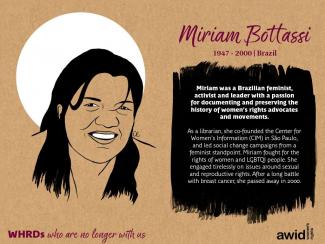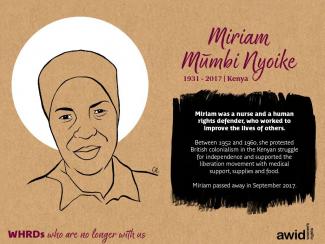
Miriam Bottassi


The “Where is the Money?” #WITM survey is now live! Dive in and share your experience with funding your organizing with feminists around the world.
Learn more and take the survey
Around the world, feminist, women’s rights, and allied movements are confronting power and reimagining a politics of liberation. The contributions that fuel this work come in many forms, from financial and political resources to daily acts of resistance and survival.
AWID’s Resourcing Feminist Movements (RFM) Initiative shines a light on the current funding ecosystem, which range from self-generated models of resourcing to more formal funding streams.
Through our research and analysis, we examine how funding practices can better serve our movements. We critically explore the contradictions in “funding” social transformation, especially in the face of increasing political repression, anti-rights agendas, and rising corporate power. Above all, we build collective strategies that support thriving, robust, and resilient movements.
Create and amplify alternatives: We amplify funding practices that center activists’ own priorities and engage a diverse range of funders and activists in crafting new, dynamic models for resourcing feminist movements, particularly in the context of closing civil society space.
Build knowledge: We explore, exchange, and strengthen knowledge about how movements are attracting, organizing, and using the resources they need to accomplish meaningful change.
Advocate: We work in partnerships, such as the Count Me In! Consortium, to influence funding agendas and open space for feminist movements to be in direct dialogue to shift power and money.
Sara AbuGhazal is a Palestinian feminist living in Beirut. She is a co-founder of Sawt al-Niswa, a collective that produces knowledge in Beirut. She is the co-director of The Knowledge Workshop, a feminist organization based in Beirut that works on feminist oral history and archiving. Sara is currently the Regional Coordinator of the Regional Coalition for Women Human Rights Defenders in the Middle East and North Africa.
Sara strives to help create spaces of feminist transformation and solidarity. Her work is mostly centered on building sustainable movements in the MENA region. She is invested in knowledge production, feminist transformation, and Palestine. She publishes regularly in sawtalniswa.org and her fiction also appears in Romman e-magazine.


Veena Singh is a Fiji Islander, a feminist and a woman of colour. Veena was born and raised in a small rural town in Fiji and is of mixed ethnicity (her mum is an Indigenous Fijian woman and dad is Fijian of Indian descent). She is a feminist development practitioner and is a strong advocate of ‘shifting powers to create positive change’ and in ‘building an economy of kindness’. Her work experience has largely been in the areas of Human Rights, Gender Equality and Social Inclusion and she has more than 18 years of professional experience working specifically in women and children’s rights, Women, Peace and Security (UNSCR 1325), Human Security, Community Development and Community Media. Veena has worked and volunteered for several Fiji-based NGOs before joining SPC- Fiji Women’s Rights Movement, FemLINKPacific, Fiji Red Cross and Save the Children (Fiji).
Additionally, Veena has worked on a wide range of development areas and issues, including Access to Justice, Conflict Prevention and Peacebuilding, Sexual and Reproductive Health and Rights (SRHR), Women’s Political Participation, Leadership and in Decision Making, and more recently in the area of Gender Statistics. Her work has enabled her to work very closely with development practitioners, feminists, activists, government representatives, and peace practitioners across the Pacific, Asia, Europe, and African Region. Outside of the office, she likes to work on promoting and protecting the environment; raising awareness on positive mental health and wellbeing; and spending time on writing.
She is a mum to 11 cats, proud wearer of sarees and a collector of postcards. Veena is a thoughtful observer on the direction of feminist activities in Fiji and the Pacific region, and in her own organisations, and seeks, as she describes it, "to decolonise her mind and the ‘self’ through radical self-reflection" but more importantly for her, she cares about putting out more relatable writing that will connect her with the Pacific diaspora. Veena holds a Degree in Community Development with Murdoch University (Australia) and a Postgraduate Diploma in Social Policy with the Fiji National University

Meet Sopo Japaridze, fierce feminist, union leader and chair of the independent service trade union at the Solidarity Network.
She left the country when she was very young to go to the United States where she first became very politically active as a labor organizer. She kept Georgia in the back of her mind all that time, until one day, two decades later, she decided to return.
The existing Georgian union confederation back then was less than ideal. So, equipped with her skills, knowledge and labor organizing experience, Sopo went back to Georgia and built her own union.
Sopo is a passionate researcher and writer. She studies labor and social relations, writes for various publications and is the contributing editor of LeftEast, an Eastern European analytical platform. She also co-founded the political history initiative and podcast, Reimagining Soviet Georgia, where she explores the complexities and nuances of the country's experiences under the Soviet Union, to better understand its past in order to shed light on how to build a better future.

Marielle was a Brazilian politician, feminist, lesbian and human rights activist.
Marielle was an outspoken critic of police brutality and extrajudicial killings. Her openly feminist, Black and favela-centered politics were a source of hope for marginalized groups in Rio de Janeiro, currently governed by a conservative city government and an evangelical mayor.
On March 14, 2018, after delivering a speech in Rio de Janeiro, Franco and her driver were shot multiple times and killed. Following news of her death crowds took to the streets shouting "Marielle presente!" (Marielle is here!) and demanding justice be done.
Read more about Marielle and the situation in Brazil

Launch of the Intergovernmental preparatory process for the 3rd Financing for Development Conference, October 2014
Lara was a well-known and loved radio DJ on Motsweding FM in South Africa.
Lara was one of the first openly-transgender radio hosts on a mainstream station. She worked hard to shine a light on LGBTI issues.
Lara’s activism started at a young age when she would vocally defend her right to dress and behave as she felt comfortable to members of her community who didn’t yet understand what it meant to be transgender.


Feminist movements have changed and adapted tremendously since we last convened in this way - so to remember why AWID Forums matter, we asked activists from around the world to reflect on and share their stories, impressions and memories. This is what we learned.
We will announce this soon. Stay tuned!
Samira was a Syrian activist under Bashar al-Asad's regime.
From a young age Samira opposed all forms of despotism, particularly vis-a-vis the authoritarian regime in which she lived.
Samira was kidnapped in 2013 along with three other prominent activists. She is believed to have been taken from the Center for the Documentation of Violations in Duma, in rural Damascus.
The main suspect associated with her disappearance is the Army of Islam (which denies its involvement). There has been no formal investigation of Samira’s disappearance and she has not been heard from since. Samira was committed to her country and refused to leave Syria until she felt her role in empowering women and documenting crimes was no longer necessary.

Yes! We are currently exploring innovating technologies to allow for meaningful connection and participation.